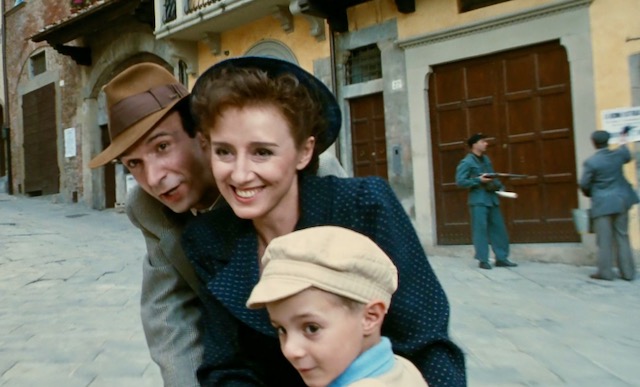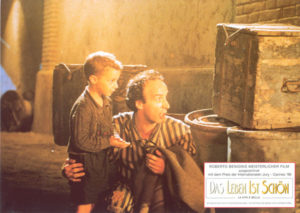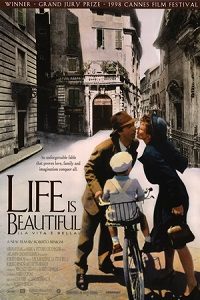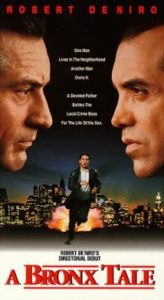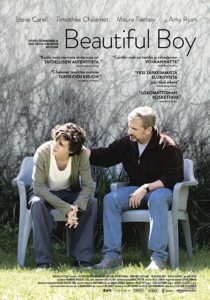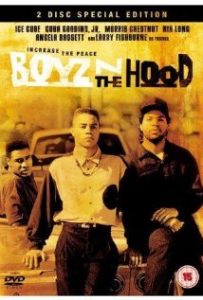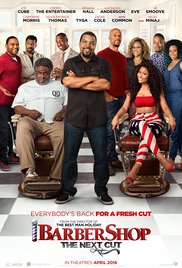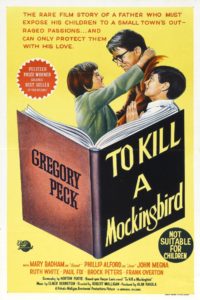Fathers in Film
All the films this week feature a father in film and Scripture to guide our thoughts concerning our role as a parent and/or the heritage of our fathers.
March 24, 3rd Sunday in Lent
The Lord is my shepherd, I shall not want;
he makes me lie down in green pastures.
He leads me beside still waters;
he restores my soul.
He leads me in paths of righteousness
for his name’s sake.
Even though I walk through the valley of the shadow of death,
I fear no evil;
for thou art with me;
thy rod and thy staff,
they comfort me.
Psalm 23:1-4
I am the good shepherd. The good shepherd lays down his life for the sheep.
This marvelous tale of a father’s love is set during the Holocaust when the Nazi’s occupied Italy. As the Jews become more constricted in their movements, Guido, who owns a bookstore, tells his young son Giosue’ that a sign in shop that reads “No dogs or Jews allowed,” merely expresses the strong dislikes of the shop owner. He asks what animal Giosue’ dislikes the most. “Spiders!” the boy replies. Guido declares that he doesn’t like Visigoths, therefore they will put a sign in his bookshop window “No spiders or Visigoths allowed.” As we will see, this is the pattern the father takes to shield his innocent son from the poisonous reality of anti-Semitism. Even when the Nazis sweep the three up in its round-up, and the pair are separated from wife/mother Dora, the father tells his frightened son that they are being sent to a vacation resort where they will play a game that requires the boy to stay in hiding all the time.
The camp rules are, Guido explains, “Don’t ask for snacks;” “Don’t cry;” and “Don’t ask for Mama.” He then explains that points will be given for proper behavior and taken away for violating the rules. The grand prize, the father declares, is a new army tank. As the days pass Guido manages to hide his son in their top bunk while he is marched off to work. He gives the boy most of his food and entertains him with stories and fantasies of their supposed good life. The film takes a certain amount of suspension of belief, but all in all it is a wonderful parable of the power of imagination and love confronting unspeakable evil. Late in the war, as a guard seems about to discover Giosue’, Guido diverts his attention, and the guard commands the father to go with him. The pair disappear around a corner and we hear the sound of shots. Shortly thereafter the boy emerges from his hiding place, with the Allied soldiers arriving to liberate the camp. The wide-eyed boy assumes he has won the prize when an Allied tank rumbles into the camp.
No shepherd was ever more faithful than Guido, giving his all to shield his innocent son from the horrors of irrational hatred. For believers Guido mirrors perfectly the love of God the Father who cares so much for this world that he has created that he sent his Son to save us. It was fitting that some of the writers of the Hebrew Scriptures saw God as the Shepherd of Israel. Guido is also like the good shepherd described by Jesus who “lays down his life for the sheep.” (The tragic irony in the Holocaust is that the twisted philosophy of those who hated the descendants of Jesus so much was derived from Christianity itself.) At the end of the story Guido’s shepherd love results in the survival of his little boy. The film doesn’t show the inevitable sorrow that Guiosu’ will feel when he learns of the sacrifice of his absent father, but this will be mitigated by that very love. May we also grow in that love, knowing that God both loves us and empowers us to love others as well. Despite tragedies like the Holocaust, may we still be able to sing “This is my Father’s world, Oh, let me ne’er forget That though the wrong seems oft so strong, God is the ruler yet…”
A guide for this film is in my book Films & Faith: Forty Discussion Guides.
March 25
A Bronx Tale
Hear, my son, your father’s instruction,
and reject not your mother’s teaching;
for they are a fair garland for your head,
and pendants for your neck.
My son, if sinners entice you,
do not consent.
Proverbs 1:8-10
Blessed is the man
who walks not in the counsel of the wicked,
nor stands in the way of sinners,
nor sits in the seat of scoffers;
but his delight is in the law of the Lord,
and on his law he meditates day and night.
He is like a tree
planted by streams of water,
that yields its fruit in its season,
and its leaf does not wither.
In all that he does, he prospers.
Psalm 1:1-3
Lorenzo is a bus driver living with his family in the Bronx. One day his nine-year-old son Calogero is playing in the street when he sees local crime boss Sonny shoot a man dead during an argument. The police question the boy, but he refuses to say anything about the crime. Grateful, Sonny befriends the boy and offers Lorenzo a job that would pay far more than his bus-driving one. Knowing well the implications of accepting, the honest man politely says “No.” Sonny pays the boy for running errands and throwing the dice in games held in his tavern. Lorenzo finds $600 in his son’s dresser drawer. Wanting no part in criminal affairs, he makes his son return the money. He tells the gangster to stay away from his boy, but Sonny keeps up his interest in him. For the next eight years, as Calogero visits Sonny’s bar every day without his father’s knowledge, Sonny becomes the boy’s mentor. Calogero admires Sonny’s command of others and his influence on the neighborhood. He echoes Sonny’s disdain for working people, “Sonny was right. The working man IS a sucker, dad. He’s a sucker.” Lorenzo replies, “He’s wrong! It don’t take much strength to pull a trigger, but try and get up every morning, day after day and work for a livin’! Let’s see him try that! Then we’ll see who’s the REAL tough guy! The working man’s the tough guy! Your father’s the tough guy!” In one area, however, Sonny is a better influence than his prejudiced father. He gives advice for the boy’s dating the African American girl has just met, and it turns out well. Sonny also in one sequence saves the boy’s life. At the end of the film Calogero is in the bar when he sees a man coming up behind Sonny, but before he can cry out, the man shoots Sonny. The killer is the son of the man Sonny had murdered eight years earlier. Even Lorenzo, grateful that Sonny had saved his son’s life, is at the crowded funeral, and when Calogero remarks how people loved him, his father observes, “People don’t love him, they fear him. There’s a difference.”
Lorenzo faced a difficult task raising his son in a gangster dominated neighborhood. His undramatic job of driving a bus paled in comparison with Sonny’s exciting life. He must have at times worried how his son would turn out, fearing the boy’s seduction by the money, stylish clothes and cars that Sonny’s rackets provided. In the story Lorenzo perseveres with his son, Lorenzo. While appreciating the ways in which Sonny had helped him, the young man realizes at the funeral that his own father’s way of life was the preferable one. We might say that Lorenzo is the kind of man celebrated at the beginning of Psalms, “Blessed is the man who walks not in the counsel of the wicked.” May you think of your father, and if he was similar to Lorenzo, may you give thanks for what he has passed on to you. Some of you who read this may be fathers, and if so, may your concern for your children be as strong as Lorenzo’s for his son. May all fathers pass on to their sons a heritage of honesty and integrity.
A guide for this film is in my book Films & Faith: Forty Discussion Guides.
March 26
For as the heavens are high above the earth,
so great is his steadfast love toward those who fear him;
as far as the east is from the west,
so far does he remove our transgressions from us.
As a father pities his children,
so the Lord pities those who fear him.
For he knows our frame;
he remembers that we are dust.
Psalm 103
What man of you, having a hundred sheep, if he has lost one of them, does not leave the ninety-nine in the wilderness, and go after the one which is lost, until he finds it? And when he has found it, he lays it on his shoulders, rejoicing. And when he comes home, he calls together his friends and his neighbors, saying to them, ‘Rejoice with me, for I have found my sheep which was lost.’
Luke 15:4-6
The story of the shepherd seeking the lost sheep is a tender one, but what if the sheep when found does not stay in the fold, but runs away again—and again? That is the true story of David Sheff and his oldest son, Nic in the film Beautiful Boy. Nic has become addicted to several drugs and drops out of college. David, who now has two other children that he has sired with his second wife, continues to love and reach out to Nic, even flying from his California home to track down David in New York City. Several times we hear the father and son making the following exchange: David, “Do you know how much I love you? I love you more than everything.” Nic, “Everything?” David,” Everything… everything.” We learn that this began when Nic was a little boy. David means it, but after a long series of cures and relapses, during which Nic drops out of college, and eventually returns and graduates, the father, after one more relapse says to Karen, “My son is out there somewhere, and I don’t know what he’s doing! I don’t know how to help him!” She replies somberly, “You can’t!” David finally must accept this bitter truth, at last turning down the sick Nic’s plea when he calls and asks to be able to come home for a rest.
Sometimes love has to be strong enough to say “No” to a loved one. If we give in to one who is in the grip of alcohol or drugs, we enable them to continue their destructive ways. This was not easy for David, nor is it easy for any other parent. Life can be hard at such a time. There is pain that must be borne. There is a limit to what human love can accomplish—and even divine love, because of the God-given free will imbued to each of us, including Nic. At such a time all we can do is to pray that a loved one who has gone astray will come to his or her senses and seek professional help. It is at such time that every father, and mother, needs the support of the Heavenly Father—and the faith to turn to him in prayer. As the psalmist reminds us, “As a father pities his children, so the Lord pities those who fear him.”
March 27
Listen, children, to a father’s instruction,
and be attentive, that you may gain insight;
for I give you good precepts:
do not forsake my teaching.
Proverbs 4:1-2
Pray then like this:
Our Father who art in heaven, Hallowed be thy name.
Matthew 6:9
The “hood” of the title is the Crenshaw ghetto of South Los Angeles, and the father is Furious Styles, an ex-serviceman with his own business helping people obtain housing loans. Divorced from his wife Reva, he has raised their son Tre ever since the boy was ten years old because his mother and teachers could not deal with his temper outbreaks. Although Tre hangs out with half-brothers Doughboy and Ricky and other boys in the hood, Tre is kept on a tight leash by his father. Years pass while the strict father instills in his son values that he hopes will make him a successful leader. During a fishing trip when their talk turns to sex, Furious tells his son that anyone can make a baby, but it takes “a real man to be a father.” During these years Doughboy and Ricky have no father in their lives, and their mother favors Ricky because he is a good high school athlete with a chance to earn a college scholarship if he can score 700 on his SAT test. Although we see he has a good heart, Doughboy has been in and out of jail on such petty charges as shoplifting and drugs. A quarrel between Ricky and a gang member leaves bad feelings between the two. On the day that Ricky learns he has reached his goal on the SAT score the gang member kills him in a drive by shooting. Doughboy and his tough friends decide to get even. They set a time to meet up and track down the killers. When Tre goes home to get his father’s gun, Furious stops him and argues against joining his friends. Tre seems to agree, but when he rejoins his friends, he gets into Doughboy’s car. However, they have not gone far when he reconsiders and asks to stop so he can get out. The next day, having wreaked their vengeance, Doughboy tells Tre he understands. The two friends, each heading in opposite directions in life, talk about their neighborhood and the unending cycle of violence they are caught in.
Title cards at the end tell us the fate of the two boys. Tre goes off to college with his girlfriend. Doughboy is murdered two weeks after their last conversation together. The difference clearly is that Tre had a father who took his responsibilities seriously, and Doughboy had only a hapless mother who could not provide any stability in their lives. May the persistence of this African American father serve as a model for us all who have charge of the young.
May our strictness with children always be infused with love because we seek what is best for them, and not just the imposition of our will. And thus, may our concept of fatherhood (or parenthood) be informed by the one who once said, “Pray then like this: Our Father who art in heaven…” At their baptism we promise to raise our child “in the nurture and admonition of the Lord.” This is a difficult task in a culture that throughout their childhood seeks to instill false values into their hearts and minds. May we seek the wisdom of this God whom Christ invites us to address as “Our Father.”
A guide for this film is in my book Films & Faith: Forty Discussion Guides.
March 28
How shall we sing the Lord’s song
in a foreign land?
… …
Happy shall he be who takes your little ones
and dashes them against the rock!
Psalm 137:4, 9
Moreover, we know that to those who love God, who are called according to his plan,
everything that happens fits into a pattern for good.
Romans 8:28 (Phillips)
Mack and wife Nan, living in Oregon, are justly proud of their three children teenaged Kate, Josh, and six-year-old Missy, all of them attending together their local evangelical church. It is little Missy who refers to God as “Papa,” perhaps influenced by Jesus’ calling his Father Abba, “Daddy” when praying. During a camping trip beside a lake, Kate and Josh are in the canoe when she stands up and overturns it. Leaving Missy behind, Mack dashes into the water and rescues the pair. Then he notices that Missy is not there, nor anywhere on the camp grounds. The authorities mount a search, anxious over a report that a child abductor had been seen in the area. Sure enough, Missy’s dress is found and then her blood stains in an old shack, but no body. Mack is guilt-ridden, even though Nan, who had stayed at home, reassures him he is not to blame. Kate also is filled with guilt because her foolish antics in the canoe had distracted her father. Mack loses interest in church, his grief unrelieved. When he receives a note signed “Papa” inviting him to the shack, he travels back to the campsite with his gun, suspicious that it might have come from the killer. To his surprise the shack becomes a lovely cottage inhabited by a trio who claim to be the Holy Trinity. Some miracles prove convincing, and Mack settles into a weekend in which each person of the Trinity—two women calling themselves Papa and Sarayu, and a Mediterranean man named Jesus—seek to ease his pain and assure them that though they did not “save” Missy, they were present with her and that she is well off now. Mack at first is so filled with grief, guilt, and a desire for vengeance against the murderer that it takes a long time for the Triune God to transform him. But eventually Mack does change, and at end of the film is in the hospital (how I will leave that to you to discover) where he is able to assuage the guilt of daughter Kate, who needs healing as much as he had.
This is a film that is aimed at Christians, not those outside the faith, a holy fantasy akin to those penned by C.S. Lewis. Its arguments can be summed up in the phrase “unconditional love.” It is a good one to watch if you have been hurt by one of life’s inevitable tragic losses. It is filled with such insights as Papa telling Mack, “When you focus on pain, you lose sight of me.” Like the exiled Israelites in Babylon, Mack had to learn to “sing the Lord’s song in a foreign land,” the land of pain and grief. And so do we all. We have to learn with the writer of Isaiah 43:2, “When you pass through the waters, I will be with you; and through the rivers, they shall not overwhelm you.” When our faith is tested, stretched even to the breaking point, may we be able to say with the apostle Paul, “everything that happens fits into a pattern for good.”
I will be finishing the following two meditations this weekend.
March 29
Fathers, do not provoke your children to anger, but bring them up in the discipline and instruction of the Lord.
Ephesians 6:4
When he came to his senses, he said, ‘How many of my father’s hired servants have food to spare, and here I am starving to death! I will set out and go back to my father and say to him: Father, I have sinned against heaven and against you.
So he got up and went to his father. But while he was still a long way off, his father saw him and was filled with compassion for him; he ran to his son, threw his arms around him and kissed him.
Luke 15:17-18, 20
Fathers, do not provoke your children to anger, but bring them up in the discipline and instruction of the Lord.
Ephesians 6:4
In this third of the Barbershop films Calvin’s role as a father is paramount, and for the purpose of this reflection, “home” is the key word. In a voice over Calvin says this about his barbershop:” In every neighborhood there’s a place folks gets together to talk about their dreams, to share their frustrations, and maybe even tell a joke or two. It’s a home away from home, and these aren’t just friends, they’re family.” His home-like barbershop on Chicago’s South Side is now in partnership with a group of female beauticians, so now it is a center for women as well as men ready to express their opinions as well as get their hair cared for. The neighborhood has become dangerous due to the warfare between two rival gangs, and Calvin’s son Jalen has become embroiled in trouble at school. Calvin considers enrolling his son in a Catholic school, despite the boy’s wishes, and he is also worried about the bad influence of one of his son’s friends. Jalen and best friend Kenny are thinking of joining a gang for protection against a rival gang that has threatened them. Without telling anyone, Calvin starts talking with a broker about finding a location on the safer north side so he can move the shop and home, thereby providing a safer environment for Jalen. In some ways Calvin and Jalen are like the father and son in Boyz N the Hood, both fathers anxious about protecting their sons from a bad environment. Tension between father and son leads to a temporary split, but when Calvin learns that Jalen is about to join the gang, he rushes to the park to stop him. Later, at the barbershop Jalen, having come “to his senses,” comes to the barbershop and asks his father to cut his hair. The following is a portion of their conversation as the father complies:
Jalen: You know I didn’t mean what I said earlier, you’ve always been there for me for everything and I appreciate it, love you dad.
Calvin: Love you too. Always gonna be my guy, I swear. All right let’s see how we can hook you up here, yeah, ok. Now listen I hear about anything I’m snatching you right up out of there you hear me.
Jalen: Yeah I hear you
Calvin: I’m not playing, be up there quick fast in a hurry, I escort you to the bathroom and everything if I have too.
Jalen: Crazy dad. but I’m fine with that. I’m just happy to stay here, happy to be home.
“Happy to be home.” This goes both for the son and father in this film, and also in Jesus’ parable about the father welcoming his son home. If a father can evoke that feeling in a son (or daughter), then he is a success. In the Scripture above the apostle Paul lays a heavy responsibility on fathers. It is almost like walking a tight rope, with the danger of too many demands on one side and too much laxness on the other. Calvin is learning that, and as he does, he reflects the image of the Heavenly Father who seeks to guide us to our heavenly home. It is toward that mysterious destination that God nudges us. Never forget, that though we are called to improve things on earth, our ultimate home is with God.
A guide for this film is in my book Films & Faith: Forty Discussion Guides.
March 30
Then Jesus told his disciples, “If any want to become my followers, let them deny themselves and take up their cross and follow me. For those wh
A guide for this film is in my book Films & Faith: Forty Discussion Guides.
March 30
Then Jesus told his disciples, “If any want to become my followers, let them deny themselves and take up their cross and follow me. For those who want to save their life will lose it, and those who lose their life for my sake will find it.
Matthew 16:24-25
As a father has compassion for his children, so the Lord has compassion for those who fear him.
Then Jesus told his disciples, “If any want to become my followers, let them deny themselves and take up their cross and follow me. For those who want to save their life will lose it, and those who lose their life for my sake will find it.
Matthew 16:24-25
Atticus Finch to some people is the ultimate film father. Kind and gentle with his children—who could forget the tender scenes when Atticus speaks with daughter Scout about her deceased mother or tells her not to fight when the kids at school are insulting him? And there is that quiet scene when Scout is asking Jem about their mother, and the listening Atticus sits outside on the front porch swing. He is also quick to mend the ways of his children, as when young Walter Cunningham is a supper guest and Scout’s criticism of the boy’s lack of table manners does not go unnoticed. Later the father passes on to Scout these words:
“If you just learn a single trick, Scout, you’ll get along a lot better with all kinds of folks. You never really understand a person until you consider things from his point of view… Until you climb inside of his skin and walk around in it.”
Atticus is a person of principle and brave at standing up for them, as demonstrated in several scenes, beginning with his willingness to defend African American Tom, wrongfully accused of raping a white woman. Atticus pays a price for going against community prejudice, as do the children. In one scene after Scout has been in a fight over him at school, he tries to convince her not to fight. In return the children show their loyalty to him during the near-lynching scene. Jem, Scout and their friend Dill venture into the darkened streets when they cannot find Atticus at home one night. They spot him sitting in a chair in front of the courthouse jail. He has improvised a light so he can read his book. Before they can draw closer, a number of cars drive up and a crowd of hard-faced men, some armed with guns and clubs, emerge to demand that he step aside so they can get to the prisoner. Sensing danger to their father, the children, instead of running away, rush to join him. It is young Scout who defuses the explosive situation by singling out and talking to one of the men, “Mr. Cunningham,” the father of the boy who had eaten supper with them. Repeating some of her father’s words of tolerance and understanding, she expresses sympathy for him, and—pulling him back from his darker side, Mr. Cunningham, no longer a faceless member of a mob, but a named individual, shrinks back from doing something terrible.
Blessed is the person who has such a father that imbues his children with such values. How rich a heritage such a father leaves to his children! (Think of the words of Jem, “Atticus says cheating a black man is ten times worse than cheating a white.”)
Those not so blessed can see in this film a model for what fathers can be. And see that Atticus Finch is a good reflection of the God, the Father who created us and wants us to be a part of his family. It is no accident that Jesus taught his followers to address God as “Abba,” an Aramaic word that didn’t just mean “Father” in the formal sense, but “Daddy,” a term indicative of a close relationship. We can enter into an intimacy with the Creator that will warm our spiritual lives until we draw our last breath. Luke tells us that on the cross as he was dying Jesus addressed God as “Father,” quoting from v. 5 of Psalm 31. It is good to see that the psalmist does not use “Father,” Jesus brought it in. (Actually, this is the second time Jesus while on the cross called God “Father,” the first being in 23:34 when he asks his Father to forgive his tormentors.) During these days of Lenten reflections may the meaning of the line from the ancient creed become ever more meaningful, “I believe in God the Father almighty…”
A guide for this film is in my book Films & Faith: Forty Discussion Guides.
